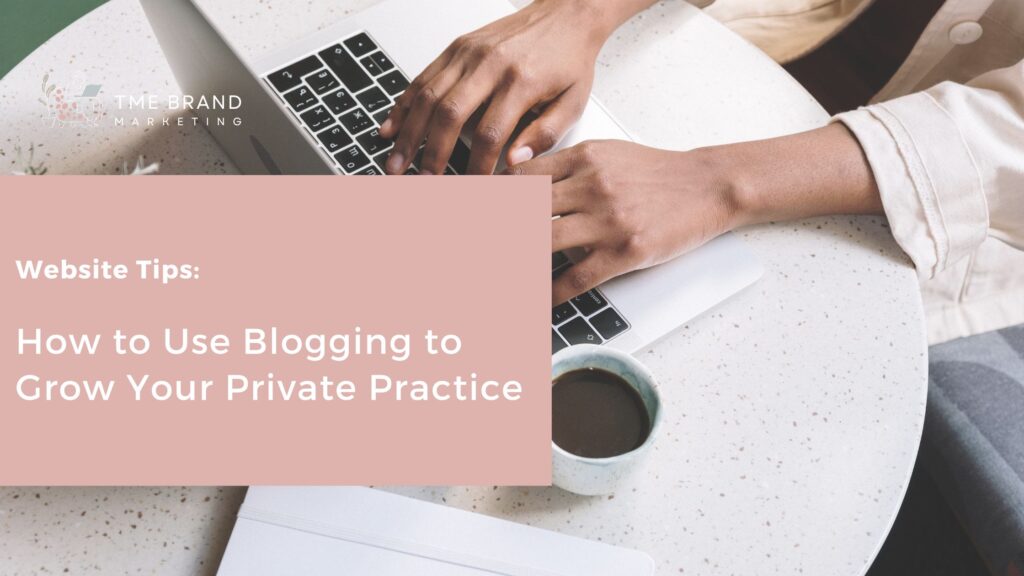
How to Use Blogging to Grow Your Private Practice
Blogging can be one of the most effective and rewarding tools in your marketing toolkit. Whether you’re a solo therapist just starting out or part of a group practice, blogging can help you grow your private practice and establish yourself as an authority in your niche. Let’s explore how.
Why Blogging Matters for Therapists
In today’s digital age, people turn to the internet for answers, especially when it comes to mental health. Blogging allows you to:
- Build trust and credibility: By sharing your expertise, you position yourself as a knowledgeable and approachable professional.
- Improve SEO (Search Engine Optimization): Regularly publishing blogs with targeted keywords can boost your visibility on Google, helping more potential clients find you.
- Connect with your audience: A blog provides a platform to address common concerns, share helpful resources, and showcase your personality and values.
Blogging isn’t just about writing; it’s about starting a conversation with your ideal clients. A marketing company for psychologists, like TME Brand Marketing, can help you create a strategy to make your blogs resonate with your audience.
Getting Started with Blogging
If you’re new to blogging, don’t worry! Follow these simple steps to start crafting blogs that grow your private practice:
1. Identify Your Niche
What makes your practice unique? Are you passionate about helping teens manage anxiety, guiding couples through relationship challenges, or supporting individuals with trauma recovery? Your blog should reflect your expertise and target audience.
When you focus on your niche, your content becomes more relevant and engaging. For example, if your niche is trauma recovery, a blog titled “5 Grounding Techniques to Manage Flashbacks” will attract readers who are likely to need your services.
2. Plan Your Content Strategy
Consistency is key. Set a realistic goal for how often you’ll publish—whether it’s once a week, twice a month, or monthly. Then, brainstorm topics that align with your niche and address your audience’s pain points. Some ideas include:
-
- Explaining common mental health terms (e.g., “What Is Cognitive Behavioral Therapy?”)
-
- Offering practical tips (e.g., “How to Set Healthy Boundaries”)
-
- Addressing FAQs (e.g., “What Should I Expect in My First Therapy Session?”)
Need help organizing your ideas? A marketing company for psychologists like ours can guide you in creating a content calendar to keep your blog consistent and impactful.
3. Write in a Conversational Tone
Therapy can feel intimidating for many people. Writing in a warm, conversational tone helps your readers feel at ease and creates a sense of connection. Avoid overly clinical jargon and aim to sound like you’re speaking directly to your ideal client.
For example, instead of saying, “Interpersonal relationships are often fraught with challenges that exacerbate stress,” try, “Relationships can be tough, and sometimes they add to our stress.”
4. Incorporate Keywords Naturally
Keywords help your blog show up in search engine results. For example, if you specialize in couples therapy, you might use phrases like “couples counseling” or “rebuilding trust in relationships.”
For this article, we’ve seamlessly included phrases like “marketing company for psychologists,” “web design for mental health therapists,” and “social media for therapists” to demonstrate how natural integration can work. A thoughtful approach to keywords ensures your content feels organic and readable while boosting SEO.
Maximizing the Impact of Your Blog
Once you’ve written a fantastic blog, what’s next? Let’s talk about maximizing its reach and impact.
1. Optimize for SEO
SEO involves more than just keywords. Here are a few tips to help your blog rank higher:
-
- Write compelling meta descriptions to entice clicks.
-
- Use headers (H1, H2, H3) to structure your content.
-
- Include internal links to other pages on your site.
-
- Add images with alt text that includes your keywords.
If the technical side of blogging feels overwhelming, don’t worry! TME Brand Marketing specializes in web design for mental health therapists, so we can ensure your blog is optimized for both aesthetics and functionality.
2. Share on Social Media
Don’t let your blog sit idle on your website—share it! Platforms like Facebook, Instagram, and LinkedIn are great places to connect with your audience. Create eye-catching graphics, write engaging captions, and link back to your blog.
Social media for therapists is a powerful way to amplify your voice and attract new clients. If you’re not sure where to start, we can help you craft a social media strategy that works for your practice.
3. Repurpose Your Content
A single blog post can provide value in many ways. Repurpose your content by:
-
- Creating short videos based on your blog topics
-
- Designing infographics with key takeaways
-
- Sending blog highlights in your email newsletter
This multi-channel approach ensures your content reaches as many people as possible.
The Role of Professional Support
Blogging can be transformative for your practice, but it’s not always easy to manage on your own. Partnering with a marketing company for psychologists like TME Brand Marketing can take the guesswork out of the process. We specialize in creating tailored marketing strategies for therapists, including:
-
- Content creation
-
- Web design for mental health therapists
-
- Social media for therapists
With our help, you can focus on what you do best—helping your clients—while we handle the rest.
Success Stories: Blogging in Action
One of our clients, a psychologist specializing in anxiety disorders, started a blog to share practical tips for managing stress. Within six months, her website traffic doubled, and she began receiving inquiries from clients who mentioned her blog posts. Another client used their blog to raise awareness about teen mental health and saw a significant uptick in community engagement and referrals.
Blogging works because it allows you to connect with your audience authentically. It’s not just about marketing; it’s about making a difference.
Final Thoughts
Blogging is more than a marketing tool; it’s an opportunity to educate, inspire, and connect. By sharing your expertise and addressing the needs of your audience, you can grow your private practice while establishing yourself as a trusted authority in your niche.
If you’re ready to start blogging but need a little help, reach out to TME Brand Marketing. Whether you need web design for mental health therapists, support with social media for therapists, or a full-scale content strategy, we’re here to help you succeed.
Remember, your voice matters. Let’s make it heard!
We’re here to help! Book a free ‘Get to Know You’ call with us today!

